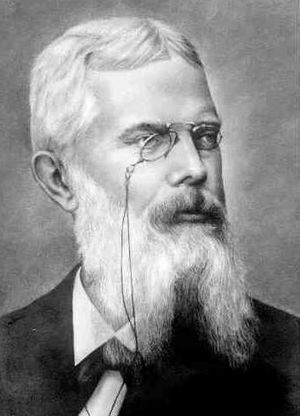Franz Mehring facts for kids
Franz Erdmann Mehring (born February 27, 1846 – died January 28, 1919) was an important German writer, historian, and politician. He was known for his work as a literary and art critic, and he was a strong supporter of socialist ideas. Mehring was a key leader of the Spartacus League during the German Revolution of 1918–1919.
Contents
Discovering Franz Mehring's Life
Early Years and Education
Franz Mehring was born on February 27, 1846, in a town called Schlawe, which was then in Pomerania. His father was a retired military officer and a tax official. Franz went to the University of Leipzig to study classical philology, which is the study of ancient languages and literature. He earned his doctorate degree in 1882. His main study was about the history and ideas of German social democracy.
Starting a Political Journey
Mehring began his career working for different newspapers. For many years, he wrote important articles for a weekly magazine called Die Neue Zeit. At first, he supported ideas that were more liberal, focusing on middle-class democracy. However, after meeting working-class leaders like August Bebel and Wilhelm Liebknecht, Mehring slowly started to support socialism.
In 1868, Mehring moved to Berlin to continue his studies. He also worked for a newspaper called Die Zukunft. From 1871 to 1874, he worked in Oldenburg, writing reports about the German parliament, known as the Reichstag. He became a well-known reporter, writing for newspapers like the Frankfurter Zeitung.
Mehring sometimes spoke in favor of the labor movement, which aimed to improve workers' rights. He started to study the works of Karl Marx in 1880. In 1884, he became the chief editor of the Berliner Volks-Zeitung newspaper. He spoke out against laws that were designed to stop socialist activities. In 1891, Mehring officially joined the Social Democratic Party of Germany (SPD).
Important Roles and Writings
Between 1902 and 1907, Mehring was the chief editor of the Social Democratic newspaper, the Leipziger Volkszeitung. From 1906 to 1911, he taught at the SPD's party school. He also served as a member of the Prussian parliament from 1917 to 1918.
During World War I, Mehring began to disagree with the SPD. He felt the party was moving away from its socialist goals, especially when it supported sending more troops to war. In 1916, a left-wing group called the Spartacus League was formed. Mehring became one of its main leaders, working alongside Karl Liebknecht and Rosa Luxemburg.
Mehring supported the Bolsheviks in Russia and their October Revolution. He wrote a book about Karl Marx called Karl Marx: The Story of His Life, which was published in 1918. This book became a very important biography of Marx and was later translated into many languages.
Final Years and Lasting Impact
Franz Mehring was already not in good health. He was deeply saddened by the deaths of his friends and fellow Spartacus League leaders, Rosa Luxemburg and Karl Liebknecht, in January 1919. He passed away less than two weeks later, on January 28, 1919, in Berlin, at the age of 73.
His grave is now part of the Memorial to the Socialists in the Friedrichsfelde Central Cemetery in Berlin. Several places were named after him, including Mehringdamm and Mehringplatz in Berlin.
See also
 In Spanish: Franz Mehring para niños
In Spanish: Franz Mehring para niños
 | Stephanie Wilson |
 | Charles Bolden |
 | Ronald McNair |
 | Frederick D. Gregory |


